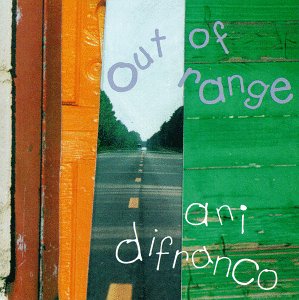back to discography
ani difranco | not so soft | imperfectly | puddle dive | like i said | out of range | not a pretty girl | dilate | more joy less shame | past doesn't go anywhere | living in clip | little plastic castle | fellow workers | to the teeth | up up up up up up | swing set | revelling/reckoning
out of range
 |
1. Buildings and Bridges
2. Out Of Range
3. Letter To A John
4. Hell Yeah
5. How Have You Been
6. Overlap
7. Face Up And Sing
8. Falling Is Like This
9. Out Of Range (Electric)
10. You Had Time
11. If He Tries Anything
12. The Diner
|
With her first four albums, Buffalo native Ani DiFranco established herself as an indie music heroine. Fans were drawn to her unyielding honesty and lack of compromise, which manifested themselves both in her songs and her refusal to follow the standard route of signing to a major label.
Even after building a following, DiFranco shunned the music industry, instead choosing to continue to release records on her own label, Righteous Babe. The fact that she held to her principles so devoutly likely attracted some fans out of curiosity, but the novelty factor can only take you so far. DiFranco is smart enough to realize that, and, on her fifth album, the brilliant Out of Range, she exploded from being an artist with an acoustic guitar to a richly versatile musician at home with a variety of instruments.
On the disc's fifth track, "How Have You Been," DiFranco breaks out a horn section and a scintillating bass line to give the tune a funked-up jazz groove. The lovely, reflective ballad "You Had Time" begins with a refined two-minute-plus piano solo that lends the song a grace and maturity far beyond that of the normal acoustic love song. She outstretches the conventional rock instrumentation by spicing up the fierce "Face Up and Sing it" with a smoking accordion backbone (courtesy of Scott Fisher).
Despite all the unique instrumentation, DiFranco is also smart enough to realize that fans are drawn to her forthright lyrical style and she never drowns out her own voice, which rings powerfully throughout Out of Range.
While DiFranco explores a wide range of topics, the disc's most powerful moments come in both her personal reflections and her views on sexual politics. On the thoughtful title track (which is done in both acoustic and electric versions), she sings, "Baby, I love you/That's why I'm leaving/There's just no talking to you/And there's no pleasing you/And I care enough/That I'm mad/That half the world don't even know/What they could'a had." The lyrical highpoint though may be in the heartbreaking "Letter to a John," in which the narrator explains how being molested at the age of 11 led her to a life of prostitution. DiFranco sings, "I was 11 years old/He was as old as my dad/And he took something from me/I didn't even know that I had." The most striking thing about the song is that DiFranco never makes a blatant tug for our heartstrings.
In not going for the obvious feelings, DiFranco shows her audience that she respects their intelligence enough to let them make their own decisions. Her followers have, in turn, shown her the exact same respect
Steve Baltin
|